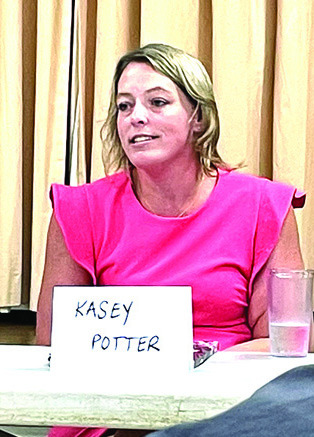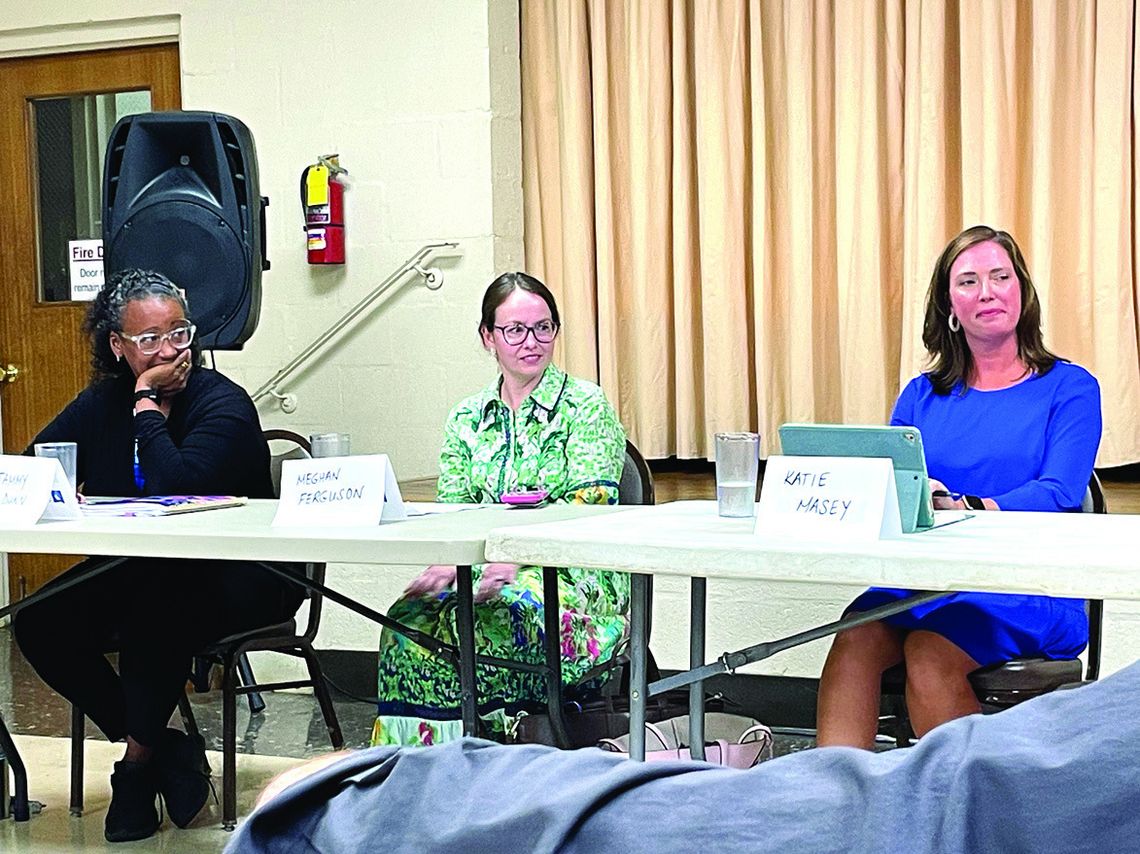Last Wednesday, parents and residents gathered at the Grace Episcopal Church to hear from the four candidates running for three available seats on the Lexington City School Board.
School Board candidates Tammy Dunn, Meghan Ferguson, Katie Masey, and Kasey Potter sat in the front of the parish hall of the church and answered questions by host and moderator Ann Olson, a retired journalist representing 50 Ways Rockbridge, which put on the event. The forum was streamed and recorded via Zoom, and the full video is currently up on the 50 Ways Rockbridge website.
This is the first time the Lexington School Board members will be elected by the public, rather than appointed by City Council. Early voting is already open and will run through Election Day on Nov. 5.
Tammy Dunn, the only incumbent on the docket, is running for reelection, while the other three candidates are running for the first time.
Book Bans
The first question posed to the candidates concerned book banning.
“In recent years, there has been increasing debate over the presence of certain books in school libraries and curriculum,” explained Olson, “with some advocating for bans based on content they find objectionable.”
The candidates were asked how they viewed the role of the School Board in this issue, how they would balance the need to protect students while providing access to broad perspectives and ideas, and what was their particular stance on banning books.
None of the candidates came out in favor of banning books, although they all stressed the need for sensitivity and listening. Ferguson and Masey both highlighted the efforts of the current School Board for the maturity with which it is handled this debate in the past.
Ferguson appreciated the restriction of public comment to only those who were relevant and qualified. “The Board established mechanisms for expressing concerns professionally and constructively, in addition to a review committee,” she said.
Both Ferguson and Masey also mentioned a check-out alert system that the School Board previously put in place, which notifies parents of the titles of books their children are checking out. “My daughter was at the library the other week and it was almost live … I got [the notification] pretty instantly,” said Masey. All candidates expressed support for the way this issue had been addressed previously.
All candidates also agreed on the importance of broad literary access. “Access to diverse reading materials across genres is essential to gaining knowledge and empathy, and developing one’s viewpoints and critical thinking skills,” said Ferguson. Potter expressed a similar sentiment, with a caveat: “I think our students should have access to different ideas that challenge them to learn a wide array of topics, as long as those books are ageappropriate.
“‘Age-appropriate’ could mean something different for each parent, and that’s okay,” Potter continued. “I don’t believe it’s the job of the School Board to step into the parent role, but it is the job of the School Board to create a base set of policies for all children in the school system … Keeping literature age-appropriate for readers is a common-sense goal.”
Dunn, being the only candidate with Lexington City School Board experience, sought to clarify the complicated process by which policies are implemented. “Banning is a strong word … We’re not banning books, but the School Board is charged with adopting a policy,” she said. “Members elected to the School Board will find out there are many, many pieces that go into developmental policy. Any concerns that come before the School Board, we talk about them, consider them, and feel it’s important to hear them.”
School Safety
The second question was about safety and security in schools. Candidates were asked how they would address issues such as bullying, mental health support, and physical security.
The candidates pointed out that while this area’s schools are relatively safe, things have been difficult for students since the onset of Covid, and that particularly, mental health would need to be an important area of focus.
Dunn touted the previous work of the School Board, and the plan and process by which security and safety features are constantly monitored. She listed features that have been updated recently, including exterior doors being re-keyed and locked at all times during the day, with guests needing to be buzzed in, and clinicians and officials that are available to staff and students for support.
Masey’s comments centered on awareness and support of teachers and parents. “Involvement, support, and educational opportunities with parents and families, are where the school can have a large impact on the emotional and mental wellbeing of students,” said Masey. “Continuing to provide teacher and staff awareness, resources and support for how to address needs of students, neurodiversity, emotional and mental health is critical.”
Potter emphasized the necessity of a comfortable and open environment for students. “This is the most important question we have tonight,” she said. “I think a point to focus on could be the overall stigma of asking for help … Even if it’s just checking in or a short conversation with a teacher or administrator, that can go a long way for a young person. Making sure staff are encouraged and prepared to have those conversations should be a priority.”
Ferguson agreed with the other candidates that “all students, teachers, and staff need and deserve to be safe and feel safe.” She brought up her experience with her child with a life-threatening food allergy, and cited bullying statistics. “When I think about my children, I think about everyone’s children,” she said. She suggested publishing a guide on bullying policies that would compile district and individual schools’ policies into one resource that can be consulted at a glance.
She proposed tightening the system of notifying parents of bullying. “Bullying is defined as repeated over time,” explained Ferguson, “however, I would expand this to include wanting to be notified of any single incidence of aggressive or unwanted behavior, just to be proactive and promote a culture of accountability.”
School Vouchers
Candidates were also asked about their stance on school vouchers, and how they would approach their potential implementation in this district.
Potter and Masey both gave a lot of credit to the Lexington school district for consistently being one of the top public school divisions in the state, asserting that its high performance makes it a competitive choice for parents.
“If our elected officials decide to implement school vouchers in Virginia, we can’t change that,” said Potter, “but what we can do is make sure we keep fostering the same learning environment that keeps us one of the best districts in Virginia. If we create amazing opportunities to learn right here in Lexington, our friends and neighbors will want to keep their children in our schools.”
Masey brought up the increase in students Lexington schools have experienced in the last few years, saying that “we do not want to expand beyond our means as a very small school district. We want to make sure we have what we need to meet our current students.” She acknowledged that school vouchers might make more of a difference in a larger area than Lexington, emphasizing that research would need to be done to make sure that the current student body would not be profoundly affected should implementation of vouchers occur on the state level.
Dunn was unfamiliar with the issue of student vouchers prior to the event, and shared some of the insights she’d learned in researching it. “Two things that stuck out to me were the financial impact it could have on a locality as small as ours, and the way it tends to cater to the more affluent families. It creates inequitable resources there.”
Ferguson was straightforward: “Unequivocally, I oppose school vouchers,” she said. “I am a proponent of fully funding our public schools, including paying our teachers and staff more competitive and fair wages. Virginia schools are already significantly underfunded at the state level.” She cited research from other states that suggested that students who use vouchers to attend private schools performed more poorly in tests than students who remained in public schools.
“Virginia ranks 40th in per-student spending out of all states for Pre-K through 12. Diverting more funding to private schools will exacerbate financial challenges for public schools,” she said.
Board Collaboration
The fourth question of the evening regarded the relationship between the Lexington school system and the Rockbridge County school system. Olson asked “How would you work to improve collaboration and communication between our city and the county school board to ensure students’ needs are met? What specific actions would you take to advocate for our students and address any concerns that arise from this arrangement?”
Dunn outlined the arrangement between the two systems, that high school consolidation was finalized 35 years ago in 1989, and that Lexington pays part of a tuition and maintenance agreement. “The superintendents and the board chairs meet twice a year to discuss any concerns, and the superintendents remain in constant contact,” she said. Overall, she touted the close relationship between the boards, and seemed in support of the arrangement continuing the way it had in the past.
Ferguson expressed a desire for the system to evolve, referring to the consolidated system as “taxation without representation.” She then cited some statistics: Lexington residents account for over 15% of the Rockbridge County High School student body. For 2024, the city is paying $1.53 million in tuition and a projected $1.79 million for 2025, along with $6.1 million in capital projects over the next several years.
Ferguson proposed the creation of a seat on the county school board to represent Lexington. “We cannot have a true partnership without a seat at the table,” she said. “I would work with Superintendent [Rebecca] Walters, both school boards, and both the city and county to establish an elected position for a Lexington city resident to serve on the county school board.”
While there are currently avenues through which the divisions are able to keep track of and communicate with one another, according to Masey, “increased engagement and communication would be a huge benefit.”
“That could be done through various avenues,” she said. “We could have a collaborative arrangement between both school boards. Specific concerns and needs can be brought to the attention of both administrations and actions, would have to vary based on what those needs are. But I think it starts with having the communication and the representation.”
Potter, who in her opening statement cited this particular issue as the reason she’s running for a school board seat, said that this unique situation “isn’t necessarily a bad thing, but it does need some work.” She cited a recent incident wherein Lylburn Downing students headed to RCHS were unable to vote in student council elections, due to having different email systems. “The current students do not have an identity as they’re transitioning to the high school.”
“The bottom line is that we need to have an open line of communication with each other,” Potter said. Potter suggested the possibility of a liaison position, which would go between the two school boards, and the idea of an occasional joint school board meeting so boards can collaborate on common issues.
Teachers And Administrators
The forum then moved from the city-county collaboration to a different kind of collaboration, between teachers and administrators. “How do you believe the administration and the school board should incorporate the expertise and experience of teachers when making decisions on policies and dayto- day operations?” asked Olson. “What specific steps would you take to ensure that teacher input is actively considered in a decision-making process?”
All candidates focused on a necessary back-and-forth between teachers and administrators. Ferguson said that she would make it a priority to talk to teachers directly, and beyond that, she suggested teacher surveys and focus groups “to solicit quantitative and qualitative data. Teacher’s input should be a large determinant of policy and operational decisions.”
“Additionally, I would like to make the School Board meetings accessible to all stakeholders by ensuring proper video and audio for those who wish to watch virtually,” she said.
Masey emphasized the value of the insights that teachers and staffers provide. “Transparency is key between the School Board, the administration, teachers, staff and parents,” she said. To aid in this transparency, she suggested there be an avenue for teachers and staff to give anonymous feedback. Regular anonymous surveys would empower teachers and staff to feel safe identifying gaps that need to be filled.
It’s important to make sure administrators have all the data they need “before jumping to conclusions,” said Masey. She also felt that data collection should include parent and family input as an important piece of the puzzle.
Potter agreed with the importance of listening. “They shouldn’t be viewed as just a resource,” she said, going on to reference the teachers that made an impact on her own life that she maintains a relationship with in adulthood.
“This is a great question, but it has a simple answer,” she said. “We need to listen to our teachers and enthusiastically invite them to participate in policy discussion … At the end of the day, they are the experts that we should be leaning on to tell us how our policy dreams actually look in their classrooms.”
Dunn once again offered a peek into the way things are already done. “Currently, teachers are asked for feedback throughout the year on certain topics such as budget priorities, school calendar, grant applications and spending, professional development plan and the strategic plan, and new mandates.”
She asserted that teachers are a huge priority in the school board, and agreed that listening to their feedback was of the utmost importance. “
Budget, Retention
The final question of the evening involved budgeting and teacher retention. “Attracting and retaining high quality teachers is essential for student success, but it also requires careful budget management,” Olson said, before asking candidates how they would prioritize teacher support.
Masey acknowledged that while teacher pay was an important aspect, some teachers had left the school system for reasons other than pay, particularly teacher burnout. “Preventing teacher burnout, and thus retention, is a priority for the school,” she said, and suggested that her aforementioned idea of anonymous questionnaires would also work for this issue.
“Collecting data to determine where funds are best allocated for teacher retention would ensure money is distributed in the most efficient manner possible,” she said. “Budget management entails advocating for more money for teachers through the city, determining where areas exist to shift funds.”
Potter said that “teachers want to work in a system where they’re appreciated, valued, and have a seat at the table.” But that is not all that’s needed, as compensation must be “at a level that is comparable to our neighbors as well.”
If elected to the Board, Potter says that “it will be my honor to advocate for and encourage our delegates and senators to include an increase in school funding in the state budget.”
Dunn was proud to mention the hard work the School Board had undertaken in recent years. “Lexington City Schools has provided 15% total salary increases over the past three years, increased hourly rates for our hourly employees, increased our rate for daily and long-term substitutes, and increased division contributions to health care premiums.”
“We’re trying to get more money in our teachers’ pockets,” she said. “Our teachers are definitely our priority when it comes to budget time,” although Dunn once again emphasized the difficulty of the School Board’s task managing the budget.
Ferguson said that the teachers and staff are underpaid. “While Virginia underfunds our schools at the state level, I still wish to make improvements at the local level,” she said.
“I want to conduct a salary study to support a substantial increase in pay for our teachers and support staff,” Ferguson said, “and I want support staff scales published just as teacher scales are published.”
Ferguson agreed with her peers that she would like to see a “teacher and staff survey to assess teaching environment, professional learning and leadership, educating all students, resources, managing student behavior and emotional wellbeing and belonging.”

CANDIDATE Kasey Potter answers a question at the school board candidates forum. (Scotty Dransfield photo)





